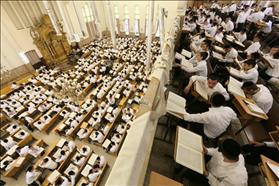Follow the Money!
Hiddush at the forefront of Supreme Court litigation in equality in sharing the burden
While it is a trying analogy, one cannot escape that fact that Al Capone was thrown in jail for evading taxes after the authorities followed his money trail. We foresee a similar trend in the religion and state battle today in Israel.
01/09/2013 13:17
Tags: Supreme Court · Equality in Sharing the burden · yeshiva funding

Students return to the Ponevezh Yeshiva in Bnei Brak after summer vacation for studies leading up to the High Holidays.
It has become more and more evident that many of the inequities associated with the non-participation of the ultra-Orthodox sector in the national burden - Army/national service, participation in the labor force, studying core curriculum in schools - will most effectively be addressed and reversed by "following the money."
We must eliminate the special financial privileges that enable the continued Haredi non-participation and were exacted by the Haredi parties' political strong-armying. We have come closer to that point of reversal than we have been in decades. The combination of the dramatic Knesset elections last January, growing public anger over many social and economic inequalities, and key landmark cases pending before the Supreme Court have all brought us closer to achieving true equality in sharing Israel's national responsibilities.
However, it is not going to be easy. Even though the government coalition does not depend on the Haredi parties, Prime Minister Netanyahu is considering his political options for the future and does not want to overly antagonize them. (Netanyahu supported a Haredi rabbi as a Chief Rabbi candidate in the 2013 elections rather than a modern Orthodox candidate that the Haredi parties vehemently opposed).The “court of public opinion” and the Supreme Court are going to be key fronts where the battle will be waged.
Tension is quickly building up as the Supreme Court gets ready to adjudicate the conflicts involving equality in military and national service, funding for Yeshiva students, and a few additional areas where benefits enjoyed by the Haredi community are being challenged or eliminated.
The legal bases for military/civil service exemption and the preferential funding go hand-in-hand. Once yeshiva students are no longer eligible for mass exemptions from military service, they should no longer receive preferential funding.
There's no quiet on the judiciary front
There are a number of Supreme Court petitions which Hiddush has initiated and is a party to. For instance, yesterday there was a hearing on three pending petitions, which the Court is addressing in one hearing.
There are a number of Supreme Court petitions which Hiddush has been involved both as a signatory and an initiator. Towards the end of August 2013, the Supreme Court held an intitial hearing on three petitions that deal with equality in sharing the burden. One of the petitions is spearheaded by Hiddush. The other two petitions focus on challenging the continued mass administrative exemption of yeshiva students from army draft. (Hiddush highly doubts that even if the new Peri Bill, pushed by the government, is passed in the Knesset, this shameful phenomenon will not be substantially altered).
Hiddush's petition, to which several other like-minded organizations have joined us as co-petitioners, focuses on the economic angle of this issue. We point to the extremely generous per capita stipends (hundreds of millions of shekels per year) taken from state coffers and given to yeshiva students who would have otherwise been expected to serve in military/civil service. The petition maintains that the legal basis for military/civil service exemption and the preferential funding go hand-in-hand. Once yeshiva students are no longer eligible for mass exemptions from military service, they should no longer receive preferential funding.
In a recent preliminary hearing held by the Supreme Court, some of the justices hinted at their displeasure over the continued governmental practice. Justice Esther Hayut highlighted the growing inequality between yeshiva and university students:
"Take a single student who starts his university studies after finishing his army service, and compare him to a yeshiva student who has been granted a continued exemption from army service and has three children. The yeshiva student will get [funds] and the university student will not receive anything?"
The latest hearing has added to the buildup of this tension. This hearing heightened expectations that, because of the reluctance of the Knesset and government to make the right move, the Court will step in, again. This is clearly a case of explosive potential. The court is not eager to pull the chestnuts out of the political fire, but it is unavoidable.